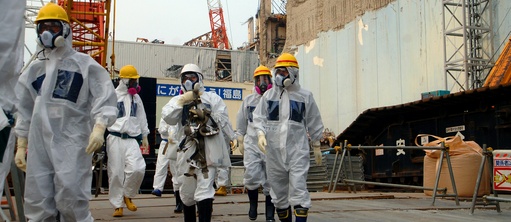Fukushima radiation is affecting the health of the entire global ecosystem, scientist says

When the Professor of Biological Sciences at the University of South Carolina took the microphone at the Foreign Correspondence Club in Japan, the global impact of Fukushima radiation became much clearer.
Scientist Timothy A. Mousseau presented "Fukushima Catastrophe and its Effects on Wildlife," before a room of press and correspondents, reporting the real-life damage that Fukushima fallout is having on the planet's ecosystem. He gave dire news to Japan and compared the damage done by Fukushima to that of Chernobyl.
Twenty-two minutes into the speech, Mousseau spoke on how the radiation is killing off birds. "These next figures are really, really important, and this really was the motivation for speaking today," he said. "These are the results from four years of data, so starting July 2011, and we just did the last count last month here in Fukushima. What this graph shows very, very strikingly is that the total numbers of birds drops off with radiation in Fukushima in a very consistent pattern."
Scientist reveals albino birds, mutant firebugs, and deformed pine trees derived from Fukushima radiation
He pointed to the consistency of bird die-offs through the years, increasing over time. He showed how both the Chernobyl and Fukushima disasters showed these striking similarities. He rose even more alarm over radiation's "effects on species richness or biodiversity," stating that the effects "are even more striking, again, dropping off with increasing radiation." He talked about mutations in birds seen near Fukushima, mentioning the first swallow with patches of white feathers. "We've since been documenting in collaboration with the Wild Bird Society of Japan many more additional cases of these albinos." He talked about other biomarkers like Japanese cows with white spots on their rears. He showed pictures of birds with tumors, showing documentation of higher frequency of cataracts in humans and birds in areas with high radiation levels. Taking it a step further, he showed growth abnormalities in both firebugs and scotch pine trees.
Mousseau showed that the effects of radiation from Fukushima are similar to that of Chernobyl, which exploded in Ukraine in 1986. "The point today is that as far as we can tell so far, there does not seem to be any dramatic difference between the effects of radiation in Chernobyl versus the effects of radiation in Fukushima. I think that is one of the take home messages," he said.
Governments continue to censor the effects of Fukushima
Mousseau detests the "official government reports" on Fukushima that downplay the impact that the radiation is having on Japan and the global ecosystem. "Contrary to governmental reports, there's now an abundance of information demonstrating consequences — in other words, injury — to individuals, populations, species, and ecosystem functions, stemming from the low dose radiation due to Chernobyl and Fukushima disasters," he stated.
At 38 minutes into his speech, Mousseau told an Associated Press reporter that the effects are not local but are impacting the global ecosystem. "I think the only conclusion you can come to from the increasing body of evidence of Chernobyl is that all components of this ecosystem seem to be affected, from the bacteria in the soil, the fungi in the soil, all the way up to the top predators… they are all connected of course. As we pick away at the various components of the ecosystem, we have not found any particular components that don't seem to be affected in some way."
Learn more by watching the conference here.
Sources for this article include:
http://enenews.com
https://www.youtube.com
Source: NaturalNews
Written by L.J. Devon
Featured image: IAEA (CC Flickr)

I warned MI5 back in 2001 about this accident waiting to happen
Big red "blob" in the Pacific –
http://beforeitsnews.com/international/2014/08/fukushima-is-destroying-the-pacific-photo-2482538.html